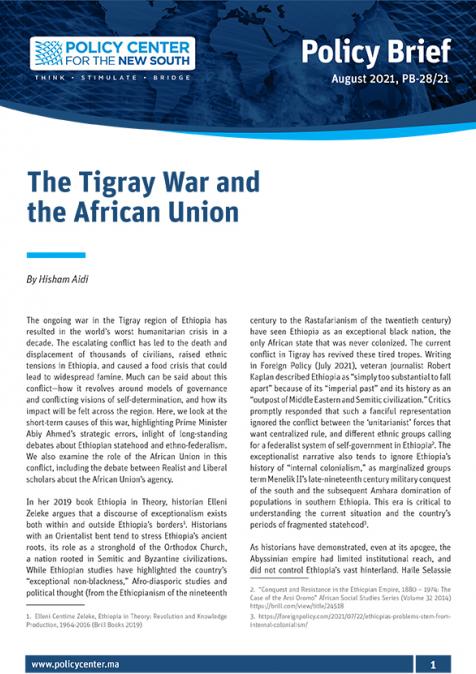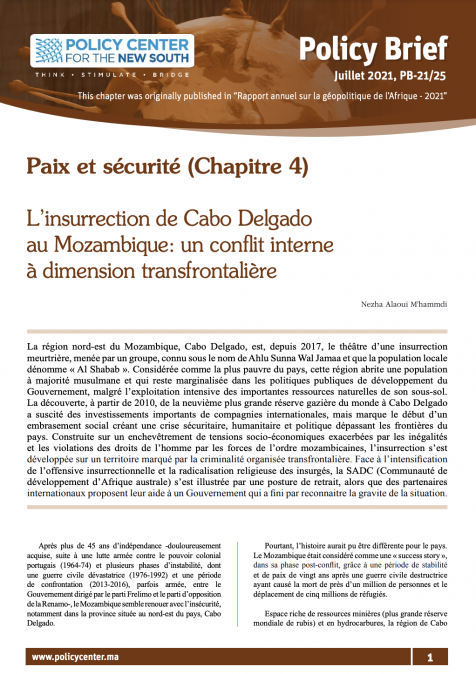As the African continent grapples with a new generation of complex and interconnected threats, ranging from violent extremism and transnational crime to governance-related tensions and climate-induced insecurity, Southern Africa is also called upon to reinforce its contribution to continental peace and security. While the region has traditionally maintained a strong reputation for stability, emerging challenges are testing the limits of existing mechanisms and requiring renewed political engagement. This conversation will explore the strategic role of Southern African leadership in shaping and operationalizing the African Peace and Security Architecture (APSA). It will examine how SADC, alongside national governments, can further align with APSA’s core pillars, early warning, preventive diplomacy, peace support operations, and post-conflict reconstruction, while upholding the principles of subsidiarity and regional ownership. Special attention will be given to how diplomacy, cooperation, and institutional coordination can help translate commitments into concrete impact on the ground.
Speakers
RELATED CONTENT
-
October 29, 202109h00 – 09h15 Mots d’ouverture Karim El Aynaoui, Président Exécutif, Policy Center for the New South Pascal Chaigneau, Directeur du Centre HEC de Géopolitique 09h15 – 10h15 : Session I - L’impuissance de la puissance Panel 1 : L’Afghanistan, un sanctuaire pour les djihadistes ? Modéra...
-
October 29, 202114h00 – 15h00: Session II - L’Indo-Pacifique : contours et enjeux Panel 3 : Contours géoéconomiques et géopolitiques Modérateur: Jamal Machrouh, Senior Fellow, Policy Center for the New South Intervenants: - L’AUKUS - Amiral Alain Oudot de Dainville, Ancien Chef d’État-Major de la Mar...
-
AuthorsPascal ChaigneauEugène BergRodolphe MonnetJacques GravereauJérémy GhezOlivier TramondNiagalé BagayokoAlain Oudot de DainvilleJérôme EvrardCoordination de l’ouvrage: Imane LahrichFatine CherkaouiOctober 28, 2021Depuis l’accession au trône du Roi Mohammed VI, l’Afrique s’est transformée en priorité de la diplomatie marocaine. Sur le plan économique, l’Afrique est devenue le prolongement naturel du Maroc en termes d’investissements et d’implantations. Pascal Chaigneau s’attarde sur les relations affaiblies Europe-Afrique, l’ambitieuse relation Chine-Afrique ainsi que les relations entre la Russie, les Etats-Unis, la Turquie ou encore les pays du Golf et l’Afrique. Ce chapitre traite égalemen ...
-
The Maghreb’s Outlook Towards the Sahel: An analysis of Morocco, Algeria, and Mauritania standpointsNihal El Mquirmi & Noamane CherkaouiOctober 22, 2021Although the Sahel has become more prominent in policymaking circles because of its strategic importance and the urgent nature of the dangers that have become rife in the region, countrie ...
-
Nihal El Mquirmi & Alain Antil (IFRI)October 15, 2021La bande sahélo-saharienne connaît, depuis quelques années, une instabilité liée à plusieurs facteurs: le terrorisme, les effets du changement climatique, les tensions ethniques et commun ...
-
 AuthorsOctober 5, 2021Seconde nation la plus peuplée d’Afrique après le Nigeria, l’Éthiopie se distingue par un essor économique continu depuis trente ans. Des progrès notables sévèrement remis en question par le conflit avec la province du Tigré, qui dure depuis près d’un an. Pays phare de la Corne de l’Afrique, l’Éthiopie s’est distinguée par une croissance moyenne à deux chiffres (10 %) sur la période 2010-2019. Tombée à 6 % en 2020, celle-ci ne devrait pas dépasser 2 % en 2021 selon l ...
AuthorsOctober 5, 2021Seconde nation la plus peuplée d’Afrique après le Nigeria, l’Éthiopie se distingue par un essor économique continu depuis trente ans. Des progrès notables sévèrement remis en question par le conflit avec la province du Tigré, qui dure depuis près d’un an. Pays phare de la Corne de l’Afrique, l’Éthiopie s’est distinguée par une croissance moyenne à deux chiffres (10 %) sur la période 2010-2019. Tombée à 6 % en 2020, celle-ci ne devrait pas dépasser 2 % en 2021 selon l ... -
 AuthorsSeptember 24, 2021In July 2021, the United Nations issued a condemnation against the “dramatic rise” in attacks against “descent-based slaves” in Mali, calling the violence “unacceptable”[i]. The statement was in response to a tragic episode in the eastern region of Kayes, where landowners using machetes and rifles assaulted a group of indentured laborers to prevent them working on the landowners’ fields. Tomoya Okobata, the UN's Special Rapporteur on Contemporary Forms ...
AuthorsSeptember 24, 2021In July 2021, the United Nations issued a condemnation against the “dramatic rise” in attacks against “descent-based slaves” in Mali, calling the violence “unacceptable”[i]. The statement was in response to a tragic episode in the eastern region of Kayes, where landowners using machetes and rifles assaulted a group of indentured laborers to prevent them working on the landowners’ fields. Tomoya Okobata, the UN's Special Rapporteur on Contemporary Forms ... -
AuthorsAugust 11, 2021The ongoing war in the Tigray region of Ethiopia has resulted in the world’s worst humanitarian crisis in a decade. The escalating conflict has led to the death and displacement of thousands of civilians, raised ethnic tensions in Ethiopia, and caused a food crisis that could lead to widespread famine. Much can be said about this conflict—how it revolves around models of governance and conflicting visions of self-determination, and how its impact will be felt across the region. Here ...
-
AuthorsJuly 26, 2021La région nord-est du Mozambique, Cabo Delgado, est, depuis 2017, le théâtre d’une insurrection meurtrière, menée par un groupe, connu sous le nom de Ahlu Sunna Wal Jamaa et que la population locale dénomme « Al Shabab ». Considérée comme la plus pauvre du pays, cette région abrite une population à majorité musulmane et qui reste marginalisée dans les politiques publiques de développement du Gouvernement, malgré l’exploitation intensive des importantes ressources naturelles de son s ...
-
Youssef Tobi & Abdelhak BassouJuly 09, 2021Dans ce podcast Abdelhak Bassou décrypte l’impact de la pandémie COVID-19 sur les activités terroristes en Afrique de l’ouest. En abordant les données géopolitiques antérieures à la pande ...






